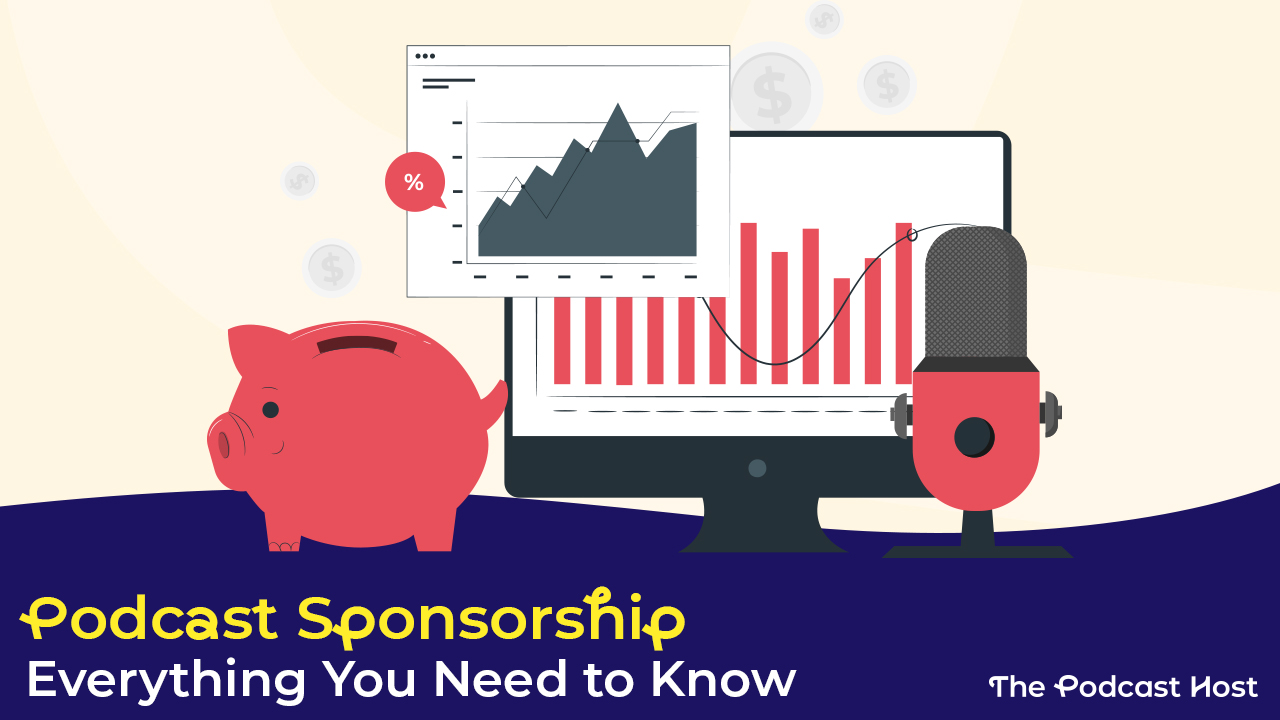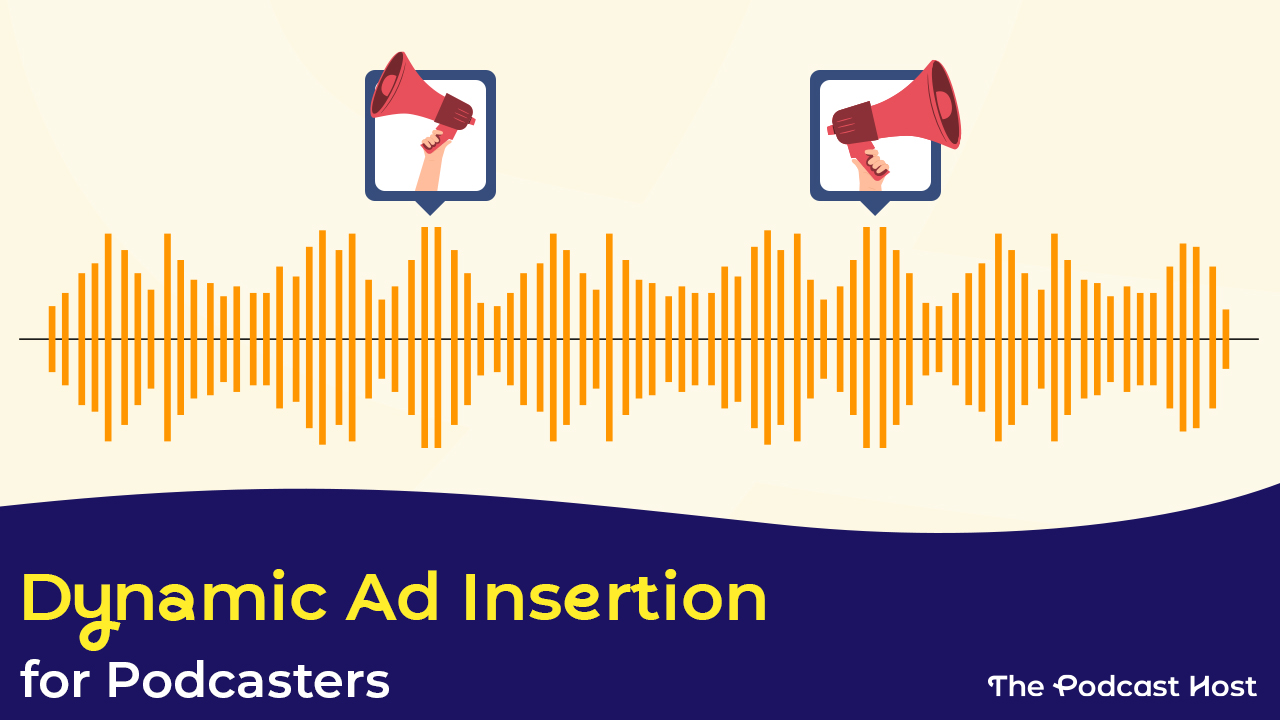Table of Contents
Podcast sponsorship is the most traditional method of monetisation in the medium. But it can take many different forms, and it’s not necessarily the right approach for everyone looking to monetise their content.
Here, we’ll take a look at the various ways podcast sponsorship can work. We’ll also cover how to reach out to potential sponsors – should you decide that it sounds like a good fit.
If you run a business and have been approached about potentially doing podcast sponsorship, check out How to Sponsor a Podcast. That’s our guide for all the info you’ll need on that front!
Why Podcast Sponsorship?
Just like people have different motivations for podcasting, they also have different motivations for monetising their content.
For one podcaster, the thought of covering their web and hosting costs is enough. Maybe even to have enough left over to treat their other half to a nice meal every couple of months.
For another, it could be an important income stream in their business, where they’re actually paying a team of freelancers and assistants to work on their show.
Ultimately, podcast sponsorship is simply a form of the age-old marketing tactic where someone has assembled a crowd, and someone else would like to advertise a product or service to that crowd.
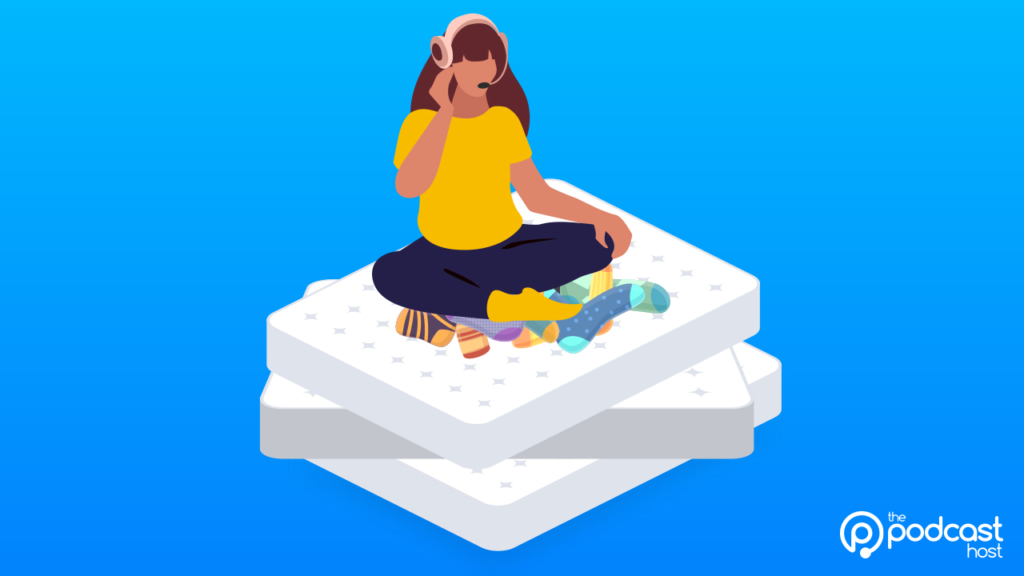
Strength of Podcasting
Most podcasts that “succeed” focus on a certain topic or niche. That means the audiences they build around them generally share a common interest. That could be anything, from losing weight, to breeding gerbils, to collecting stamps, or brewing coffee.
Straight away, this gives podcasting the strength of targeting. Advertising on a podcast isn’t like putting up a billboard at the side of a road, where 90% of the folks who see it aren’t a company’s target audience.
Granted, targeting isn’t exclusive to podcasts. Things like trade magazines and blogs can be very niche and targeted, for example. But the other big strength of podcast sponsorship is in the delivery method.
Long-form audio content means listeners can spend lots of time listening to a presenter in a very intimate way, and on a regular basis.
This builds a layer of trust and authority. It’s much harder to do this in the written word, where blog posts are Googled and skimmed for the one piece of info the reader wanted.
How Podcast Sponsorship Works
At the most basic level, the advertiser pays to have their product or service promoted on one or more podcast episodes.
Commonly, podcasts deliver ads in one of two ways.
‘Host Read’ Ads
The most effective way is for the host to talk about the product or service. They’ll tend to mention why they recommend it, some examples about how they themselves use it, how they benefit from it, and why the listener would too.
Done well, (and legitimately!) a host read ad can just be another part of the episode content, as opposed to sounding like an interruption.
‘Radio Style’ Ads
An alternative is for a third party to create adverts. This way, the podcaster simply has to play them on their episodes. This is a lot less effective because the audience listens to hear the thoughts and opinions of the presenter. Having a random Voice-Over interrupting the content to quickly give you a sales pitch can be jarring, and even annoying. Listeners can fast-forward as soon as they hear the change in cadence or background sound.
Placing of Ads
An advert might appear at the very beginning of an episode, the very end, or somewhere in between. These slots are known as:
- Pre-Roll – Before the content starts
- Mid-Roll – during the main content of the episode
- Post-Roll – After the content has finished
Mid-roll is the most desired spot (and thus, the most expensive). Listeners are less likely to skip this content. Post-roll is the least optimal position for an ad, but it’s also the cheapest.
How Do I Create a Good Podcast Advert or Sponsorship Slot?
Doing the ads yourself is going to make them more effective. Your audience turns up to hear you, after all.
There’s a couple of options open to you here. You can do the ad during your recording, or you can record and mix one separately and stitch it into the finished episode. Let’s talk a bit about both approaches.
Sponsorship Slots as Part of Your Content
Here, you’ll talk about a product or service during the recording of your episode.
Pros
- Minimal interruption to your content. When done well, these are really just another aspect of your content offering and can blend in seamlessly.
- Minimal editing and production – you don’t need to add in any segments in the editing phase.
Cons
- Can be difficult to transition to during a podcast interview.
- Can be more difficult for the inexperienced presenter to “get right” first time.
Pre-Producing Your Podcast Ad
The alternative is that you script up your ad, record it as its own segment, and edit it into the episode.
Pros
- You don’t need to think or worry about doing your ad reads during the recording session. This lets you focus completely on your episode topic.
- You can take a bit more time to craft your ad read, and feel like the finished product sounds just right.
- Pre-recorded ads are easier to run a ‘Mid-Roll’ ad during a podcast interview.
Cons
- This type of ad – although delivered by you – can still be seen as an interruption by some of your listeners.
- If you’re playing the same one on every episode, it can train your listeners to hit the skip button.
- It can begin to grate on those who’re bingeing through your back catalogue.
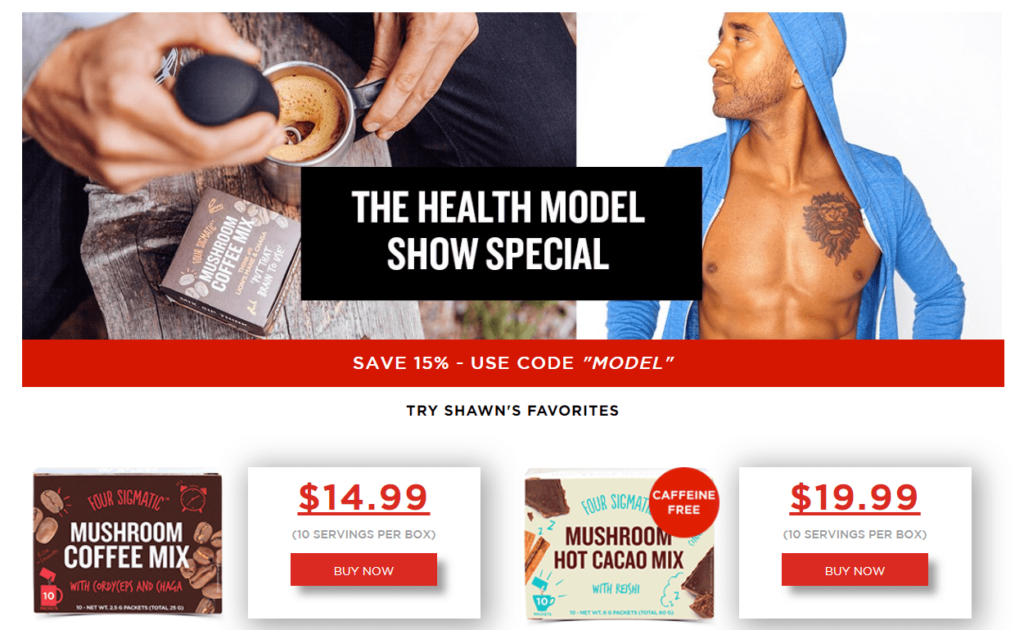
A Model Example
Here’s a podcast that I think pulls of sponsorship and advertising flawlessly. It’s called The Model Health Show.
The host, Shawn Stevenson, has built an army of dedicated listeners over the course of his 450+ episodes.
He’s sourced sponsorship from the makers of many of the products he uses himself. From food and supplements to gym equipment.
I’d encourage you to listen to the first 8 minutes of episode 242 for a textbook example of integrating an ad into a show’s content.
This isn’t an 8-minute long advert. It’s just so well done that it’s hard to notice an ad has actually started. And yet, it puts the message across far better than any old-fashioned interruption style advertising would.
I also mentioned dedicated website sections, host recommendations, and coupon codes. One of the show sponsors is Four Sigmatic and this is an excellent example of where listeners are being pointed to.
This is an arrangement where the podcaster, the sponsor, and the audience are all benefiting from every aspect of the agreement.
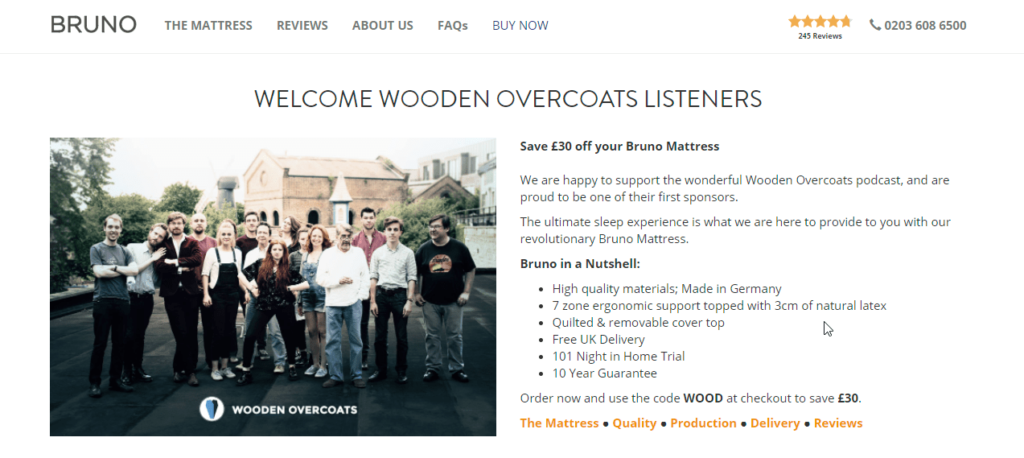
Sponsoring Fiction Podcasts
There are great opportunities to be found in sponsoring fiction podcasts or audio dramas too. These shows tend to have really hardcore, fanatical followings.
Again though, just dropping a pre-recorded advert into an episode is never going to take advantage of that.
Some of the best adverts I’ve heard in podcasts have been on fictional shows, because the makers can get really creative with them. They can build them right into the story world.
In Wooden Overcoats (a sitcom following the antics of two rival funeral directors) you’ll hear some outstanding examples of their Bruno Mattress commercials. Check out the opening few minutes in Season 2, episodes 2, 3, and 4.
With fiction podcasts, it’s obviously a little harder to nail down listener interests and demographics. But producers tend to know their audiences well, and a quick chat with them will help establish whether or not you’re a good fit for each other.
How Much Does Podcast Sponsorship Cost?
There’s certainly no one-size-fits-all answer here, and lots of variables to consider.
There’s what’s known as the “CPM model” (or cost per thousand listeners). This is a method of measuring advertising based on audience numbers.
Typically, podcasters stand to earn around $20 per ad, per 1000 downloads, within 30 days of an episode’s release.
CPM can work well for podcasts that have download numbers in the thousands. But, many podcasts have much smaller audiences than that.
A smaller audience doesn’t make it any less valuable though. In fact, the opposite can be true, the more hyper-targeted it is.
Imagine you ran a podcast about building rockets capable of flying humans to Mars, and you only had one listener – but that listener was Elon Musk. How much do you think you could charge for an ad slot on that show? Basically, you could name your price.
A very niche show with around 200 listeners might charge $150 per episode, whilst a podcast with 5000 listeners based around a much more general topic might struggle to get a better deal than $20 CPM.
The good news is, that if you own your podcast – as most do – then it’s entirely up to you what you charge. That doesn’t necessarily mean someone will be willing to pay it. However, it does mean that there’s no need to run ads if you’re unhappy with the amount they offer.
Affiliate Sponsorship
Another model of podcast sponsorship is the affiliate commission route. Here, you run ads in the same manner as above. Instead of being paid per episode, or per 1000 downloads, payment is based on how many people actually buy the product or service.
This is a route many early stage podcasters go down, because it can be difficult to negotiate a good deal when you have a brand new show and fledgling audience.
The downside is that there’s no guarantee of any commission at all. On the flip side, there’s no cap on what you could potentially earn, if your ads resonate with your audience.
You usually don’t need permission to sign up to affiliate schemes either, so you can run ads on your podcast from episode 1 if you want to. Check out our post on affiliates for podcasters where you can choose “sponsors”, based on your content, your audience, and which ones are a good fit for both.
You can track sales and commission in various ways. Some use special tracking URLs, others coupon codes – some of which might even offer a discount for your listeners. Ultimately, this will all depend on the particular affiliate scheme you decide to work with.
Dynamic Ads
Some media hosts and agencies can set you up to run ‘dynamic’ ads on your podcast. This means that you can earn from running ever-updating radio-style ads on all of your episodes.
An argument for this could be that any ‘baked in’ ads you ran 100 episodes ago, or 5 years ago, are still being played in your back catalogue, but you’re no longer earning from them.
Whilst this is true, the rates in dynamic advertising are so low that’s there’s really no value there at all. I’ve seen examples of podcasters earning a whopping two cents (literally, two cents) for an entire month of running dynamic ads.
On top of that, the ads are often irrelevant to your audience, break up your content in a jarring manner, and generally annoy your listeners.
As a side note, the fact that non-dynamic, ‘baked-in’ ads continue to play in your back catalogue “forever” can be sold as a benefit to potential sponsors. For more on that, check out Should I Sponsor a Podcast?
Downsides of Podcast Sponsorship
Things change the minute there’s money involved. And your podcast is no exception.
If you’re taking payment from anyone, you have an obligation to them. They’re paying you for a service, and you need to deliver and try to keep them happy.
Up until now, if your podcast has been a hobby, you might’ve been able to miss the odd week if you were too busy, or just didn’t feel like hitting record.
That changes when someone has paid to advertise on your show though, especially if those ads are time-sensitive.
Additionally, you have a duty to your audience. You’ve slowly built up a level of trust with them. What if they begin to question whether your latest episode was only released because you were getting paid to run an ad?
Take this all into consideration before deciding for certain that you want to go down the sponsorship route. Remember too, that if you’re looking to earn from your content, but don’t like the idea of running ads, then other podcast monetisation avenues are available.
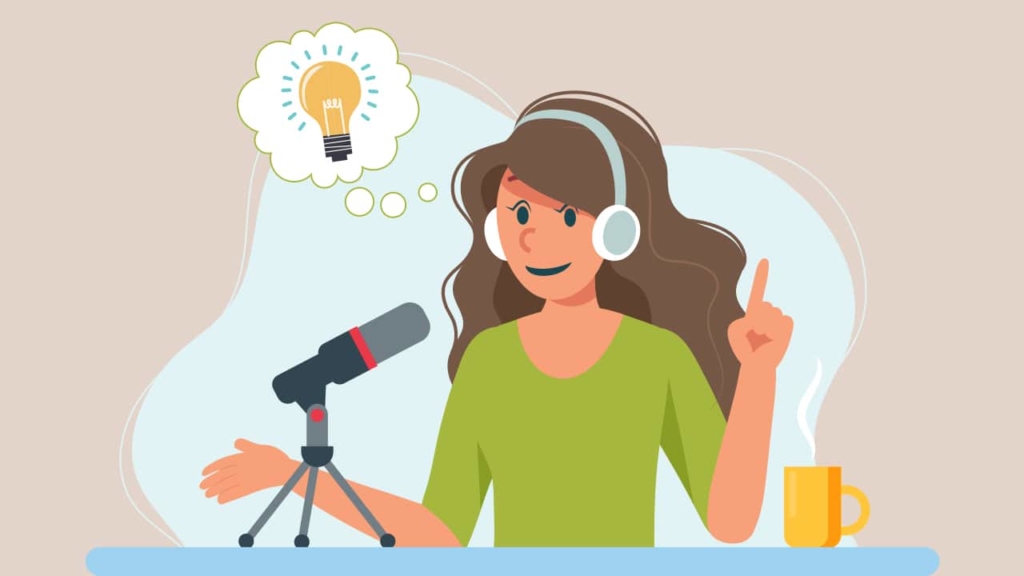
How Do I Find a Sponsor?
There are media ad agencies and podcast hosting platforms that can work with you to help set up a sponsorship agreement for your show. This is the “middleman” approach, which can be easier to get off the ground, but less fruitful in the long run.
Typically, these services will look for a certain level of downloads too. Commonly, this is 5000 US-based downloads per new episode, within the first month of its release.
Most podcasts have significantly lower numbers than this though. We’ve talked about how having a smaller audience doesn’t necessarily make it any less valuable. But if your audience is in the low hundreds, you’ll likely be better off seeking out your ideal sponsor and attempting to negotiate a deal with them directly.
For identifying potential sponsors, think of products or services you use that would also improve the lives of your listeners. This is totally topic dependent, but a few examples might be
- A running podcast where the presenter is using a certain piece of tech to measure her performance.
- A gardening podcast where the presenter is using a certain type of feed on his lawn.
- A show about miniature wargaming where the presenter uses a certain company to buy paints and models.
Either of these podcasters could reach out to the companies behind the products they use, and make a pitch.
Our How to Sponsor a Podcast article was designed as a guide for business owners who’ve been approached about potentially advertising on podcasts. You can use this resource, either as a template for your own pitch, or you can just link them to it directly. It’ll answer all the questions they’re going to ask about how sponsoring your podcast not only will work – but how it’ll benefit them.
Creating a Media Kit
If you decide to actively seek out a sponsor, then it’s good practice to create a media kit for your podcast.
Here’s our full guide to creating a podcast media kit.
A media kit is basically the essential information about sponsoring your show, packaged up in an easy-to-read manner. You might create it as a designed and illustrated PDF, either available on request, or via direct download from your site.
In a media kit, you’ll want to include things like:
- Information about your audience. Their needs, wants, and pain points
- The role your podcast plays in your niche or topic
- Download and/or engagement statistics
- Episode pricing & slot availability
- Links to samples of your audio – make it easy for them to hear you
- Some examples of listener reviews you’ve had
Also, be sure that you make it easy for potential sponsors to contact you. This isn’t just relevant to folks seeking a podcast sponsor, but podcasters in general. Create a ‘Contact’ page on your website, and in there, list and link to every way in which someone can interact with you.
Podcast Sponsorship: Next Steps
- Planning to approach a business about sponsoring your podcast? Use our How to Sponsor a Podcast guide to create your pitch.
- Create a Media Kit for your show. Also, consider creating an audio trailer to present your work in a succinct manner.
- Not fully bought into the sponsorship route, but want to explore monetisation? There are other options available.
Finally, if you’d like more tailored help with podcast sponsorship, or any other aspect of podcasting, join us in Podcraft Academy. In there, you’ll find all of our video courses, downloadable checklists and templates, and we run weekly live Q&A sessions, too!
